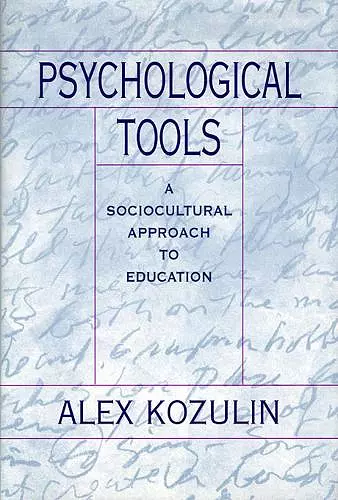Psychological Tools
A Sociocultural Approach to Education
Format:Paperback
Publisher:Harvard University Press
Published:20th Jan '02
Currently unavailable, and unfortunately no date known when it will be back

Kozulin has established himself as a significant interpreter of Vygotsky, and Psychological Tools makes a major contribution to our ability to think in psychological terms about what actually happens in the process of education. -- Sheldon White, Harvard University Clarifies for the contemporary reader just how Vygotsky's thought evolved, in clear, precise language that makes Vygotsky's work accessible to novices. Kozulin gives us a fresh perspective on Vygotsky's key concept of psychological tools by showing how it works in classrooms filled with children from radically different cultures. -- Jane E. Knox-Voina, Bowdoin College
Kozulin argues that the Vygotskian concept of “psychological tools” offers a useful way to analyze cross-cultural differences in thought and to develop practical strategies for educating immigrant children from widely different cultures.
The concept of "psychological tools" is a cornerstone of L. S. Vygotsky's sociocultural theory of cognitive development. Psychological tools are the symbolic cultural artifacts--signs, symbols, texts, formulae, and most fundamentally, language--that enable us to master psychological functions like memory, perception, and attention in ways appropriate to our cultures. In this lucid book, Alex Kozulin argues that the concept offers a useful way to analyze cross-cultural differences in thought and to develop practical strategies for educating immigrant children from widely different cultures.
Kozulin begins by offering an overview of Vygotsky's theory, which argues that consciousness arises from communication as civilization transforms "natural" psychological functions into "cultural" ones. He also compares sociocultural theory to other innovative approaches to learning, cognitive education in particular. And in a vivid case study, the author describes his work with recent Ethiopian immigrants to Israel, whose traditional modes of learning were oral and imitative, and who consequently proved to be quick at learning conversational Hebrew, but who struggled with the reading, writing, and formal problem solving required by a Western classroom. Last, Kozulin develops Vygotsky's concept of psychological tools to promote literature as a useful tool in cognitive development.
With its explication of Vygotsky's theory, its case study of sociocultural pedagogy, and its suggested use of literary text for cognitive development, Psychological Tools will be of considerable interest to research psychologists and educators alike.
Kozulin has established himself as a significant interpreter of Vygotsky, and Psychological Tools makes a major contribution to our ability to think in psychological terms about what actually happens in the process of education. -- Sheldon White, Harvard University
Clarifies for the contemporary reader just how Vygotsky's thought evolved, in clear, precise language that makes Vygotsky's work accessible to novices. Kozulin gives us a fresh perspective on Vygotsky's key concept of psychological tools by showing how it works in classrooms filled with children from radically different cultures. -- Jane E. Knox-Voina, Bowdoin College
This is a magnificent book. It is brief, devourable and rich in both its erudition and thought-provoking ideas. As soon as I had finished it for the first time, I immediately began again… This is a book which can be read at a number of different levels and where the author’s love of and deep knowledge about his subject shines through every page. -- Bob Burden * British Journal of Educational Psychology *
ISBN: 9780674007086
Dimensions: unknown
Weight: 236g
192 pages